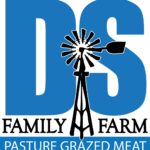Worried about what you are "really" eating? Have peace of mind with pasture grazed meats.
Sardines of the Plains
Sardines are a great source of omega 3 fatty acids but hey, why not enjoy some great tasting Pasture Grazed Beef from DS Family Farm?
Omega 3 fatty acids are important because (prior posts):
- Omega 3 is the anti-inflammatory fat
- Fatty acids are “essential” to our health
- (there are no ‘essential’ carbohydrates)
- A Standard American Diet (SAD) = high inflammatory Omega 6 fats
- Combat the SAD diet by sourcing low omega 6:3 food, such as Pasture Grazed beef.
Yes, salmon and tuna provide an even better source of omega 3 fats but (1) no ocean’s on the plains of Nebraska and (2) fish have mercury issues. Dr. Mercola recommends Sardines over large fish as sardines are lower in the food chain where mercury has not yet accumulated.
Pasture Grazed Beef vs. Sardines
DS Family Farm “Pasture Grazed” beef matches the omega 6:3 ratio of sardines at 2:1 (omega6:omega3). We have not tested beef for mercury because beef are low on the food chain just like sardines! Our pasture grazed beef only consuming what nature provides, forages. And yes, Dr. Mercola endorses pasture raised meats for both the omega 6:3 ratio and higher levels of conjugated linoleic acid (CLA).

Why we test Omega 6:3 each year
Providing a true “grassfed” product for you, our customer, is why we do what we do at DS Family Farm. Based on current research, testing the fatty acid profile of beef will give a good indication of what the animal consumed leading up to harvest. If the animal only consumed forages, the omega 6:3 ratio will be low. The lowest 6:3 ratios will be from cattle harvested when the nights are cool and pastured on growing legumes. Based on our test results from 2015 – 2018, you can rest assured when purchasing Pasture Grazed Beef from DS Family Farm you are receiving a true “grassfed product”.
Looking for additional assurance that our beef only consumed forages for their entire lives?
- Visitors are welcome to inspect our operation at any time.
- Please call ahead to schedule your visit!
- DS Family Farm is annually “Certified Grassfed by AGW”.
- Learn more about the certification process at A Greener World.
Is the omega 6:3 ratio really an important health claim?
- Again, we test the Omega 6:3 ratio after harvest to ensure our customers that our beef is what we claim, a true “grassfed” product.
- For your health, please do your research. We believe anyone can improve their health by eliminating any bad items from our diets. Eliminating highly processed foods common to the Standard American Diet will improve ones overall intake of omega 6 vs. omega 3 fats (see last year’s omega 6:3 update).
- For further reading consider this issue of Mark’s Daily Apple.
Other recent findings concerning omega 6 and omega 3 fatty acids and diet:
Dec. 2017: Impact of Omega-3 Fatty Acids on the Gut Microbiota
“In summary, based on conducted studies, the omega-3 PUFAs can be considered prebiotics. Therefore, the consumption of an omega-3-rich diet has been thought to be beneficial for health, but the gut microbiota changes in humans associated with omega-3 PUFAs are poorly understood. Future research with well-conducted clinical trials is needed to analyze the relationships between omega-3 PUFAs and the gut microbiota.”
Nov. 2017: Omega-3 Index and Anti-Arrhythmic Potential of Omega-3 PUFAs
“Recently published papers included in this review suggest that there is a permanent interest of both clinical and experimental cardiologists, to explore the anti-arrhythmic potential of omega-3 PUFAs. Although apparent progress is observed and the majority of findings suggest benefits of omega-3 PUFAs, there is still not enough evidence for their routine implementation into the clinic.”
Mar. 2016: An Increase in the Omega-6/Omega-3 Fatty Acid Ratio Increases the Risk for Obesity
“Obesity is a preventable disease that can be treated through proper diet and exercise. A balanced omega-6/omega-3 ratio 1–2/1 is one of the most important dietary factors in the prevention of obesity, along with physical activity. A lower omega-6/omega-3 ratio should be considered in the management of obesity.”
Apr. 2018, Abstract: Increasing omega-3 levels in meat from ruminants under pasture-based systems.
“There is mounting evidence that regular consumption of n-3 FAs is beneficial for growth and development as well as the health and welfare of humans of all ages. The dietary background of ruminants significantly influences the concentration of n-3 FAs in red meat. Meat from forage- or grassfed ruminants has a greater concentration of n-3 FAs than that from their feedlot or grain-fed counterparts and can also offer a favourable n-6:n-3 ratio in the meat. Scientific literature shows that the advantages of consuming n-3 FAs enriched meat (foods) outweigh the disadvantages.”




